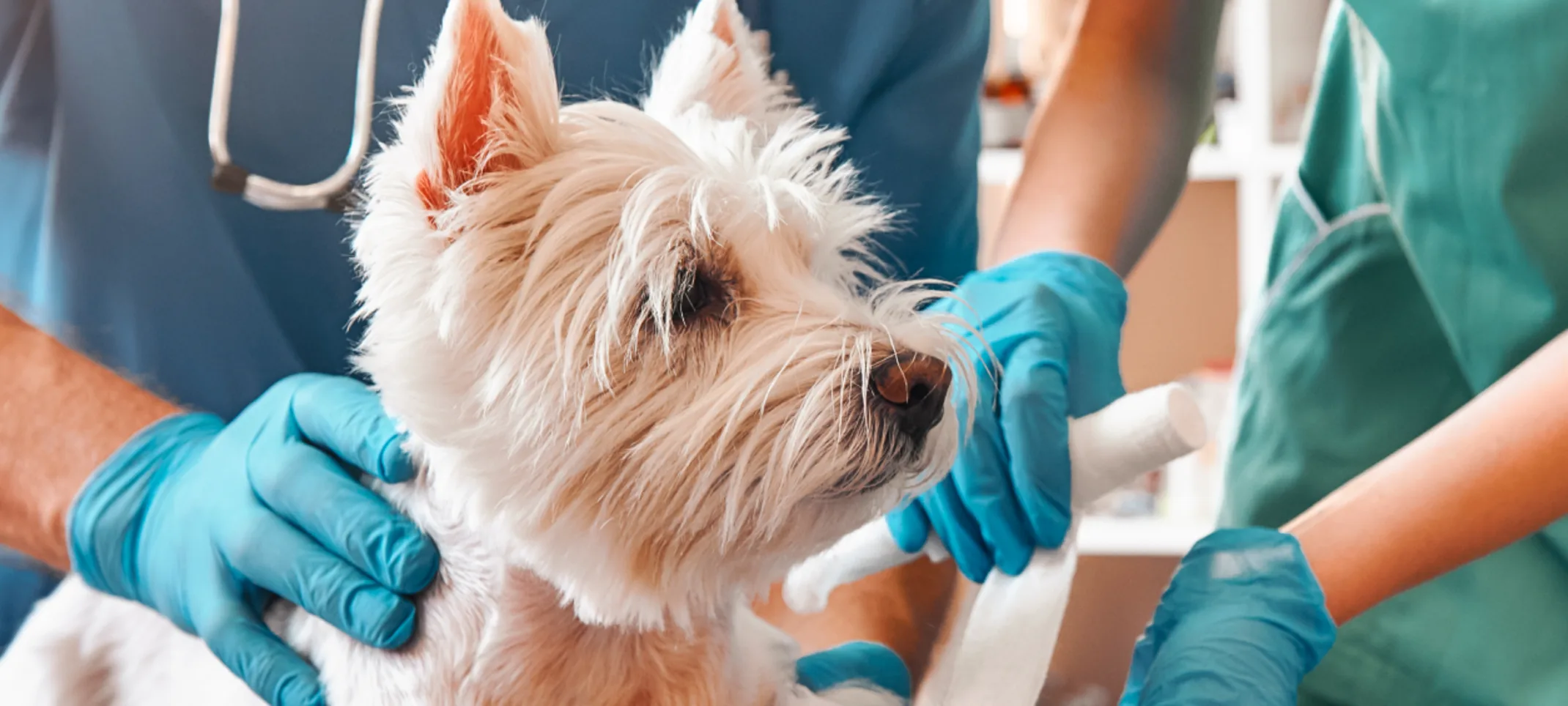I-20 Animal Medical Center
Preventing Pet Emergencies

Pet emergencies are sudden and unexpected, and usually happen when we least expect them. Many of the emergencies we see in dogs and cats can be prevented. Below are ways to prevent some of the most common emergencies we see in veterinary medicine.
Should my pet be eating that?
Know which foods your pets should avoid. They include chocolate, coffee, alcohol, grapes, raisins, sugarless gum and desserts containing sugar-free Xylitol, onions, garlic, avocados, macadamia nuts and any moldy food.
Teach your pet swimming pool survival skills
Prevent swimming pool tragedies. Teach your pet not only how to swim, but where the steps are located so that they know how to get out. Don’t assume they won’t ever fall in when you aren’t around, it happens all too often.
Consider rattlesnake vaccination
If you live in an area with rattlesnakes and/ or copperhead snakes consider rattlesnake vaccination. Although if a snake bite occurs, treatment is still vital, the vaccine will lessen the severity of the effects making treatment more effective.
Keep pets in the back yard or on a leash
This prevents your pet from being hit by a car, being injured in a fight (bite wounds) and being exposed to poisons. It also minimizes the risk of exposure of cats to contagious diseases such as Feline Leukemia and Feline Immunodeficiency Virus (Feline AIDS). The City of Arlington as well as many other cities require that dogs and cats be confined at all times. This means in the back yard or on a leash.
Keep electric cords from chewing puppies
Keep electric cords out of reach of chewing puppies. A surprising number of puppies and young dogs are treated in our animal ER each year for electric shock after biting into an electric cord. Electric shock can cause fluid build-up in the lungs (pulmonary edema) and can cause death. Seek treatment immediately.
Don’t let dogs ride in the back of the pick up truck
Many patients have been seriously injured by either falling or jumping from the back of a moving truck. A pet jumping out of a truck during heavy traffic could also cause a serious car wreck. They can also be injured by sudden starts and stops. Even if they are not injured, they may become lost if they jump out and you don’t know it.
Cap metal lawn edging with plastic, or replace with a non-metal type
We see numerous patients with paw lacerations from metal lawn edging. (This is also a hazard to humans going barefooted.) Capping metal lawn edgings or replacing with non-metal lawn edgings will prevent accidents.
Keep cats away from lily plants and flowers
Lily plants and flowers are toxic to cats. Even the pollen is toxic. Toxicity can occur even when your cat eats less than one leaf. If your cat comes into contact with pollen, wash your cat immediately. Kidney damage can occur and the sooner you treat the less chance of permanent kidney damage.
Prevent heat stroke
Make sure outdoor pets have access to plenty of shade and fresh water, and never leave a pet in an automobile with the windows rolled up. During the warm months, temperatures inside cars with closed windows can become high enough to produce heat stroke in only a few minutes. Don’t take dogs jogging during the hottest part of the day. They don’t sweat like we do, and consequently they don’t regulate their temperature as efficiently as humans do.
Keep over-the-counter and prescription medications where pets can’t get them
Drugs like Tylenol and ibuprofen can be toxic to pets, especially cats. Even though veterinarians often prescribe human drugs for pets, they carefully insure proper dosing. For example, a digoxin tablet prescribed for a human could cause death in a 4-pound Yorkie.
Keep Rat baits out of the reach of pets
Rodents are always a problem in Texas, but especially during the warm months. There are 3 different types of rat bait available for over-the-counter use, and many are routinely used. All 3 types are toxic to pets, so sure you set them in a place that your pet can’t get to. Seek emergency care immediately if you think your dog has ingested rat bait. Bring the box the poison came in, so that we can determine what the active ingredients are to ensure proper treatment. Pet owners may place rat baits in areas THEY THINK are not accessible by their pet, only to find out that their pet has dug, or burrowed or wiggled their way through the barricades, shelves or barriers to find and consume the rat bait.
Keep pets away from Antifreeze
Keep antifreeze in closed containers where pets do not have access. Watch for antifreeze that has drained from cars into streets or driveways – a few laps from antifreeze that has dripped or leaked out from a car is enough to cause toxicity. Antifreeze contains a substance, ethylene glycol, which is very toxic to kidneys. It is also very sweet, which is the tragic reason so many pets are poisoned by it each year. If you see your pet drinking antifreeze, seek veterinary treatment immediately! There is a non-toxic antifreeze, called Sierra®, which can be used safely around pets.
Keep string, thread and sewing needles away from cats
There is something about a needle and thread, or even string that apparently intrigues cats. Surprisingly, we see quite a few cats each year that have swallowed thread and become critically ill. Thread damages intestines as it tries to move through. Usually exploratory surgery is required to remove the thread or string.
The doctors and staff at I-20 Animal Medical Center, located in South Arlington off of
Interstate 20, are committed to your pet’s health for wellness exams, vaccinations and emergency care. Doctors and nurses are on the premises 24 hours a day to provide emergency care any time- days, nights or weekends. I-20 Animal Medical Center is a double accredited (general medicine and emergency/ critical care) AAHA certified hospital. For additional information you can call us at 817-478-9238.
